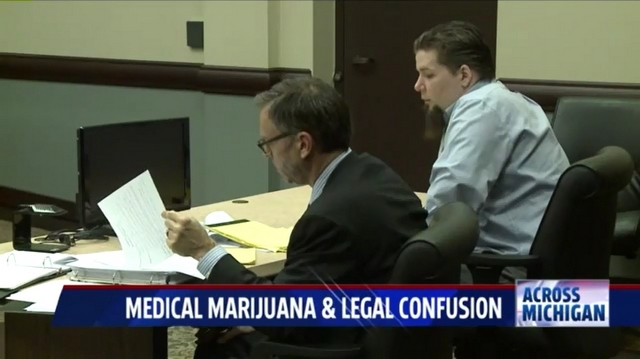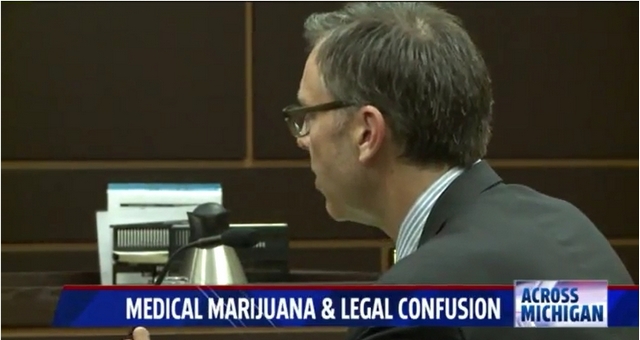April 23, 2015 – In Western Michigan yet another Michigan Medical Marijuana patient is fighting for his freedom in a system of confusing laws. He is also fighting for the right to see his child all while the State of Michigan possibly destroys his family and financial future. Max Lorincz -unlike most who plead to the sometimes bullying tactics of the court system – is standing up for his right use the medicine recommended by a doctor.
The fly in the ointment in this case is that the marijuana was a concentrate and not what is described as usable in the Michigan Medical Marihuana Act.
The story has been covered by the Fox 17 News program. Below is some further information from the online website.
GRAND RAPIDS, Mich. – A Spring Lake father already served jail time and is due back in court for another felony charge of medical marijuana concentrates possession, despite having a medical marijuana card.
Max Lorincz told FOX 17 has suffered years of pain from a long list of ailments, including herniated back discs and severe celiac disease. Yet when he started to use prescribed medical marijuana edibles and concentrates, his pain faded.
Here’s the hook: even though Lorincz has a medical marijuana card and thought he was following the law, marijuana concentrates are not necessarily protected under the Michigan Medical Marijuana Act.
“When I got on the edibles, it was able to calm my stomach down enough and get things under control better than any medications they’d prescribe me,” said Lorincz.
Recently Lorincz was charged with felony marijuana concentrates possession. As he awaits court, the judge ordered him to be drug tested. Now he said he is forced back on powerful painkillers; pills Lorincz said make him feel like a zombie.
Under the current Michigan Medical Marijuana Act, “usable marijuana” is defined only as the dry leaves or dry flowers of the plant. Under its section four, users are protected to have up to 2.5 ounces of “usable marijuana,” Concentrates are not and according to the People v. Carruthers, don’t qualify for section 4 immunity.
Medical marijuana users can find defenses under section 8 of the act when they meet certain criteria. Prosecuting status quo tactics are usually stripping a defendant of their section 4 and section 8 immunity by any means therefore disallowing any reference of medical marijuana in a trial to a jury.
There is legislation pending that would amend the Michigan Medical Marijuana Act to include perhaps a more specific definition of “usable marijuana.” However, this House Bill 5104 has been hung up for months, after the Michigan Senate referred it to a committee last August.
Since seeing FOX 17’s coverage of Lorincz’s case back in February, Defense Attorney and President of the Michigan Medical Marijuana Association Michael Komorn took on Lorincz’s case pro bono. For the last six years, Komorn said he’s dedicated his practice exclusively to medical marijuana patient and caregiver representation.
But his case has come with some devastating consequences. In February Lorincz was charged with a two-year felony: possession of a schedule 1, controlled, synthetic substance. Schedule 1 is defined as a controlled substance that has no medical use.
Now his five-year-old son is taken away, and he is left with only supervised visits. All of this because Lorincz called 911 in September for a family medical emergency. The deputy who responded to the call found a smear of butane hash oil in his home. It’s a substance Lorincz ingests for what he called “deep pain relief,” and is something he obtained with his medical marijuana card.
“I’m outraged by it, it shouldn’t have happened,” said Komorn.
Komorn said medical marijuana is not a controlled substance. In fact, Michigan law states marijuana is a schedule 2 drug. Yet because Lorincz is charged with having a schedule 1 drug, and not specifically marijuana, Komorn said it is difficult to protect Lorincz under section 8 immunity of the Michigan Medical Marijuana Act.
Komorn believed part of the issue is a recent policy change in Michigan State Police Lab reporting.
“They had a policy change by why?” asked Komorn. “The policy changed. The motivation for it was if they report it this way, people like Max won’t be able to claim a medical marijuana defense.”
The lab technician in Lorincz’s case testified that he has been testing tetrahydrocannabinol, or THC, for 25 years. THC is the main psychoactive ingredient in marijuana, also present in synthetics. However, a recent policy change means the technicians have to write “origin unknown” when testing this type of THC on lab reports. The technician said he could not tell if the sample was synthetic or natural.
The prosecution argued Lorincz’s residue was not “usable marijuana,” as defined in the previous court case, People versus Carruthers; therefore, Lorincz should be bound over for trial. However, Komorn argued that a hash extraction comes directly from the resin of the plant.
Komorn said this lab policy change is the difference between a felony and no charge at all for Lorincz, stating he should be protected under the Michigan Medical Marijuana Act. Komorn asked the judge to dismiss it.
“(The lab technician) admitted that on the stand,” said Komorn. “That is very, very, very disturbing to me, because it means that the politics in the law are affecting the truth. That’s not how it’s supposed to be. We’re supposed to rely on science to make the case.”
For now Lorincz said he is following court’s orders and is back to taking what he calls debilitating prescription pain-killers.
Read More Detail From Fox 17 The Report Here
Also Check This Out
Prescription Pain Killers – Deaths Fall In States With Medical Marijuana













